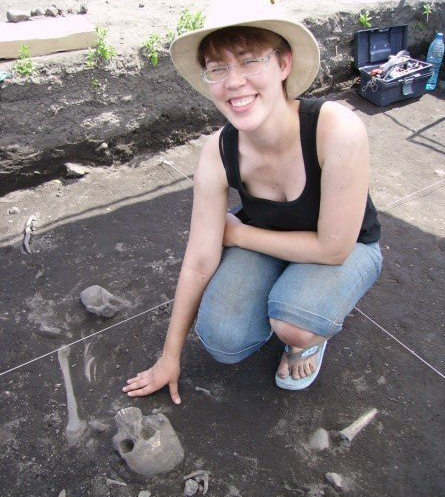Vanier Scholar reads stories written in bone

Madeleine Mant excavating a medieval cemetery in Giecz, Poland in 2007. One of ten Vanier Scholars from McMaster, Mant will travel to England to study the skeletal remains of 1000 individuals. She will look for evidence of perimortem trauma, which will help her paint a clearer picture of post-medieval society. Photo courtesy Madeleine Mant.
Madeleine Mant wants to bring history to life by learning how 19th century Londoners died.
Mant, one of 10 McMaster students awarded $50,000 Vanier Graduate Scholarships Tuesday, will study evidence of “perimortem trauma” – injuries which occurred at or around the time of death – on the skeletal remains of 1000 individuals.
She will travel to England to collaborate with the Museum of London’s Centre for Human Bioarchaeology, where she will study remains found at a range of sites. These include lower, middle and upper class gravesites and mass epidemic and pauper graves.
Trends in types of perimortem trauma among certain populations tell researchers how people commonly died.
The trauma is commonly found on the battlefield.
Mant says she’s looking for the “stories written in bone”, which give context to what’s already known about post-medieval society.
“I want to compare historical records with what’s actually in the field,” she said. “Once we know where to look, we can better understand what injuries were most common during that time, which give us the ‘biocultural context’ needed to paint a clearer picture of the era.”
Mant also hopes to develop a framework for other researchers to use when studying skeletal remains found elsewhere, such as those at Smith’s Knoll, near the site of the Battle of Stoney Creek.
Her supervisor, anthropologist and Canada Research Chair Megan Brickley, is studying the remains of more than 20 soldiers who fought the important War of 1812 battle. Like those in London, the remains – unearthed 12 years ago from a common grave – hold clues as to just what killed each of the individuals.
The period is of special interest to Mant, who chose to study at McMaster because of the opportunity to work with Brickley. She hopes to one day apply the framework she develops in London to sites on Canadian soil.
“Lots of remains located here are tied up in lengthy land claims disputes, but there are plenty of opportunities to study things like European settler cemeteries or the remains of fur traders,” said Mant. “These are all people who led very interesting lives.”
The Edmonton native says she’s “outrageously thankful” for the Vanier Scholarship, and is eager to start working in the field.
“I was surprised, happy and overwhelmed when I found out I got it,” she said. “The recognition is inspiring. It shows that this work really is important, and that we’re not just scratching away in an office somewhere.”
Another one of McMaster’s 2012 Vanier scholars, Branavan Manoranjan, plans to establish a molecular profile of cells that evade therapy in brain tumours. His goal: increase the survival rates of children suffering from medulloblastoma, the most aggressive form of pediatric brain tumour.
“To be named a Vanier Scholar is like getting the corner piece of a cake with lots of icing,” says Manoranjan, a medical/graduate student in the Department of Biochemistry & Biomedical Sciences. “It has always been a true privilege to be working under the mentorship of some of the leading stem cell and cancer scientists at McMaster. And to be recognized as a potential research leader provides me with a gentle reminder of my responsibility to Canadians to translate my lab research to clinically-feasible bedside therapies”.
This year’s is the largest group of Vanier Scholars in McMaster’s history.
“This award highlights the fact that our graduate students are true leaders within the University, in the broader Hamilton community, nationally and around the world,” said Allison Sekuler, associate vice-president and dean of graduate studies. “We’re thrilled that Canada has recognized their accomplishments with such a great honour.”
McMaster’s 2012 Vanier Canada Graduate Scholarship winners
Canadian Institutes of Health Research recipients:
- Marisa Azad (Biochemistry & Biomedical Sciences, Faculty of Health Sciences), researching mechanisms to battle antibiotic resistance
- Dr. Adalberto Loyola-Sanchez (Rehabilitation Sciences, Faculty of Health Sciences), will devise strategies to develop community health programs to improve the lives of people with chronic conditions
- Branavan Manoranjan (Biochemistry & Biomedical Sciences, Faculty of Health Sciences), profiling brain cancer stem cells responsible for untreatable tumours in children
- Jocelyn Wessels (Medical Sciences, Faculty of Health Sciences) will focus on how endometriosis progresses, leading to new therapies and diagnostic tests
- Dr. Reza Yousefi-Nooraie (Clinical Epidemiology & Biostatistics, Faculty of Health Sciences) will research the role of social networks in improving public health decision- making in Canada
Natural Sciences and Engineering Research Council of Canada recipients:
- Amanda Beers (Psychology, Neuroscience & Behaviour, Faculty of Science), researching the effect of age on visual perception
- Jenna Gillen (Kinesiology, Faculty of Science) will focus on the regulation of skeletal muscle metabolism as related to exercise
- Renee St-Onge (Biology, Faculty of Science) will work towards a better understanding of specific bacteria, which is a major producer of pharmaceutical compounds used in medicine
Social Sciences and Humanities Research Council of Canada recipients:
- Madeleine Mant, (Anthropology, Faculty of Social Sciences), research focused on breaks or injuries to bone that occur at or around the time of death
- Cara Tigue (Psychology, Neuroscience & Behaviour, Faculty of Science), will investigate how voice pitch influences voters’ perceptions of a politician’s position on certain issues
Established by the federal government in 2009, the scholarship awards each student $50,000 a year for up to three years.

